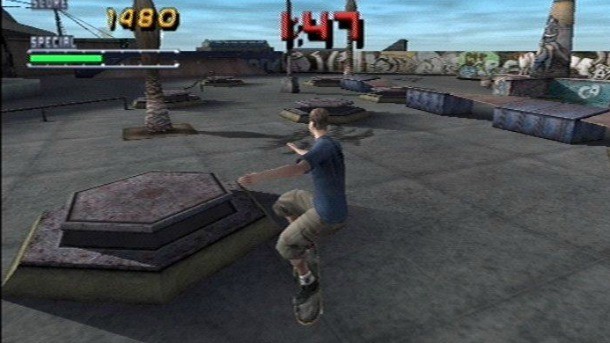Please support Game Informer. Print magazine subscriptions are less than $2 per issue
Developer Salute – Neversoft Circa 2000

Since the meltdown of the Guitar Hero franchise, Neversoft has suffered layoffs and fallen off the map. While it's currently assisting Infinity Ward on the Call of Duty franchise within the Activision empire, in 2000 the studio was operating on the highest level.
The studio's most prominent accomplishment that year was in the franchise for which is is most known: Tony Hawk's Pro Skater. Neversoft released Tony Hawk's Pro Skater 2 in 2000, a game that still ranks among my top 10 games ever made.
While the original Tony Hawk brought us a skateboarding experience that was more epic and addictive than we'd ever imagined, the second game was a true classic. It improved on the original game in every respect: bigger and better levels, better tricks, and level creators that opened up the creativity of the audience.
However, the thing that truly separated THPS 2 from its predecessor was the addition of the manual. This easy ground trick allowed players to extend trick chains while traveling between grind rails or ramps. On paper, that might not sound like much, but the ability to string together trick chains exploded the challenge and creativity inherent in the Tony Hawk gameplay. Suddenly, you felt as if you were an artist, carving out impressive lines while exploring the large environments. In the next game, Neversoft would add to this with the revert, a move that allowed you to chain after landing on a ramp.

Tony Hawk's Pro Skater 2 put the series on the map as one of the premier video game franchises of the early aughts. However, the other game that Neversoft released in 2000 -- while not as perfectly realized might have had a greater lasting impact.
Spider-Man, the 2000 Neversoft game based on the comic book franchise, was the first sign of what would become a full-blown renaissance for the webslinger in the new century. Just two months later, the first issue of the Ultimate Spider-Man comic would hit, with Sam Raimi's blockbuster film to follow in 2002.
While it may look archaic by today's standards, Spider-Man was one of the first superhero games to truly capture the feeling of freedom that comes with superpowers. Instead of the side-scrolling adventures of years past, finally we were able to websling our way through a (for its day) impressive open city. Sure, the limitations of the original PlayStation meant that everything from about 20 feet below the top of every building had to be masked in fog, but it was a damn fine piece of programming.

I'd never really felt like a game put me in the shoes of a superhero before. Older games tended to feel like a Spider-Man or Batman skin had been placed over a character in a typical genre game (in fact, that probably wasn't far from the truth). In Spider-Man, I could do anything: fly through the air, pick up huge objects with spider-strength, unleash powerful attacks on enemies – you name it.
I'll admit that Spider-Man has aged worse than Tony Hawk, and it was never as polished. But I see its influence everywhere, from Crackdown to Batman: Arkham City to the recent Saints Row IV. Anytime a developer lets a superhuman character loose to fly through an open world, they owe a small debt to Neversoft.
I hope Neversoft gets a chance to work on a new, original franchise someday. For a time, the studio was as good as it got in games, and in 2000, it had one hell of a year.










